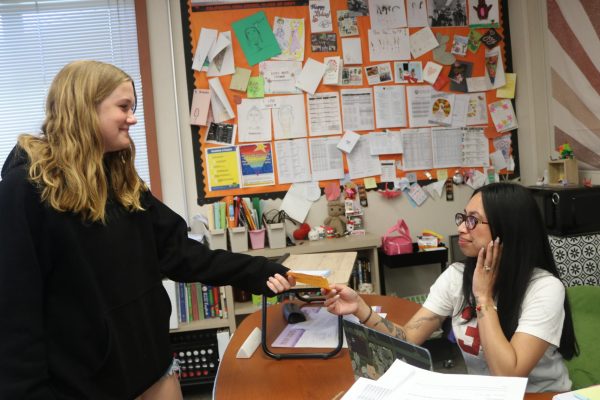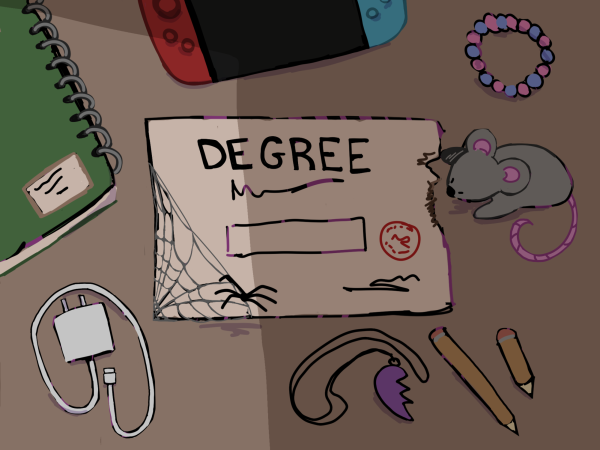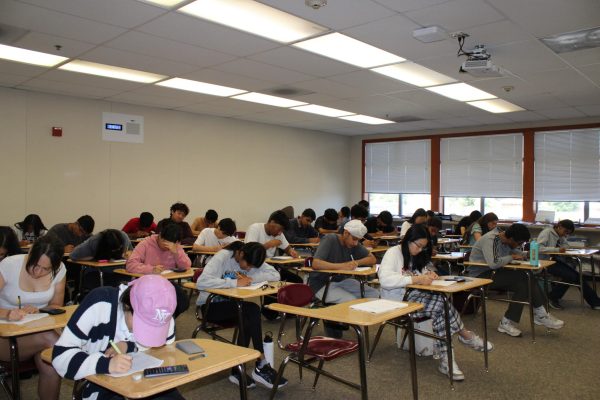Should Florida ban controversial books? – NO
Illustration by Mira Prabhakar
Florida’s education system, depicted as alligators because it is the Gator State, debate the issue of controversial books.
In 2022, about 40 percent of all books banned in America contained LGBTQ+ themes, characters, or messages, according to a study by PEN America, a literature and human rights organization.
To make things worse, the amount of books being banned in general has increased significantly from 2021 to 2022, and likely will continue to do so. The diminishing of strictly LGBTQ+ content in school is a push toward a more closed-minded society.
This gradual increase in the number of books being banned, specifically books that contain LGBTQ+ content, is part of an agenda to remove “inappropriate content” from schools being championed by states such as Florida and Texas. Florida Gov. Ron DeSantis, one of the leaders behind this movement, states that the content of these books is not appropriate for children. He argues it is necessary to remove these books from school libraries and classrooms to allow parents to regain control of their children’s education.
The effects of this movement aren’t only limited to more conservative-leaning states, as a movement has started in the Bay Area. People in the San Ramon Unified School District are pushing to have “Gender Queer: A Memoir” banned from high school libraries.
The censorship of books containing LGBTQ+ themes will ultimately cultivate a generation of youths that may be ignorant of contemporary issues regarding people that identify as part of the LGBTQ+ community.
Ignorance is one of the many root causes of hatred, and the lack of understanding is found in a lot of extremist political groups, making it harder for future generations to unite over any common ground.
Many of those that argue in favor of book bans state the propagation of LGBTQ+ ideas may go against the moral or religious values of students’ families. Even if this is the case, banning books in this way will cause more problems than it solves. Regardless of one’s opinion on many progressive ideas on gender and sexuality, refusing to teach this content by restricting books is the wrong way to go about it.
Withholding information that may foster debate about this important political and social issue will do nothing but cause the topic to stagnate. The idea that censorship is the most obvious course of action for a lot of people is a problem on its own.
In a country as progressive as America, children should be exposed to as much information as possible at a young age to grow their interests and opinions in a way that benefits society.
Many American households purposely steer their children away from LGBTQ+ topics due to bias or personal reasons, causing children to have little to no knowledge of this community.
Keeping sensitive information from those who have no qualms about receiving it is a bad precedent to set. Those on the right say that teaching this subject can “indoctrinate” children into a certain way of thinking early on in life.
While this could be a valid concern, it does not warrant the massive ban on books that we see today. We must inform students of these topics before they find out in a much less accepting environment. Steps can be taken to address this issue without censoring books.
This movement gained lots of steam simply because it reduces the spread of LGBTQ+ information. Preventing students from learning about topics that could diversify and educate America’s youth is not the way to help our nation.

Senior Rohan Iyer is a staff writer for the California High school newspaper. This is the second time he has taken part in The Californian paper as a writer,...







